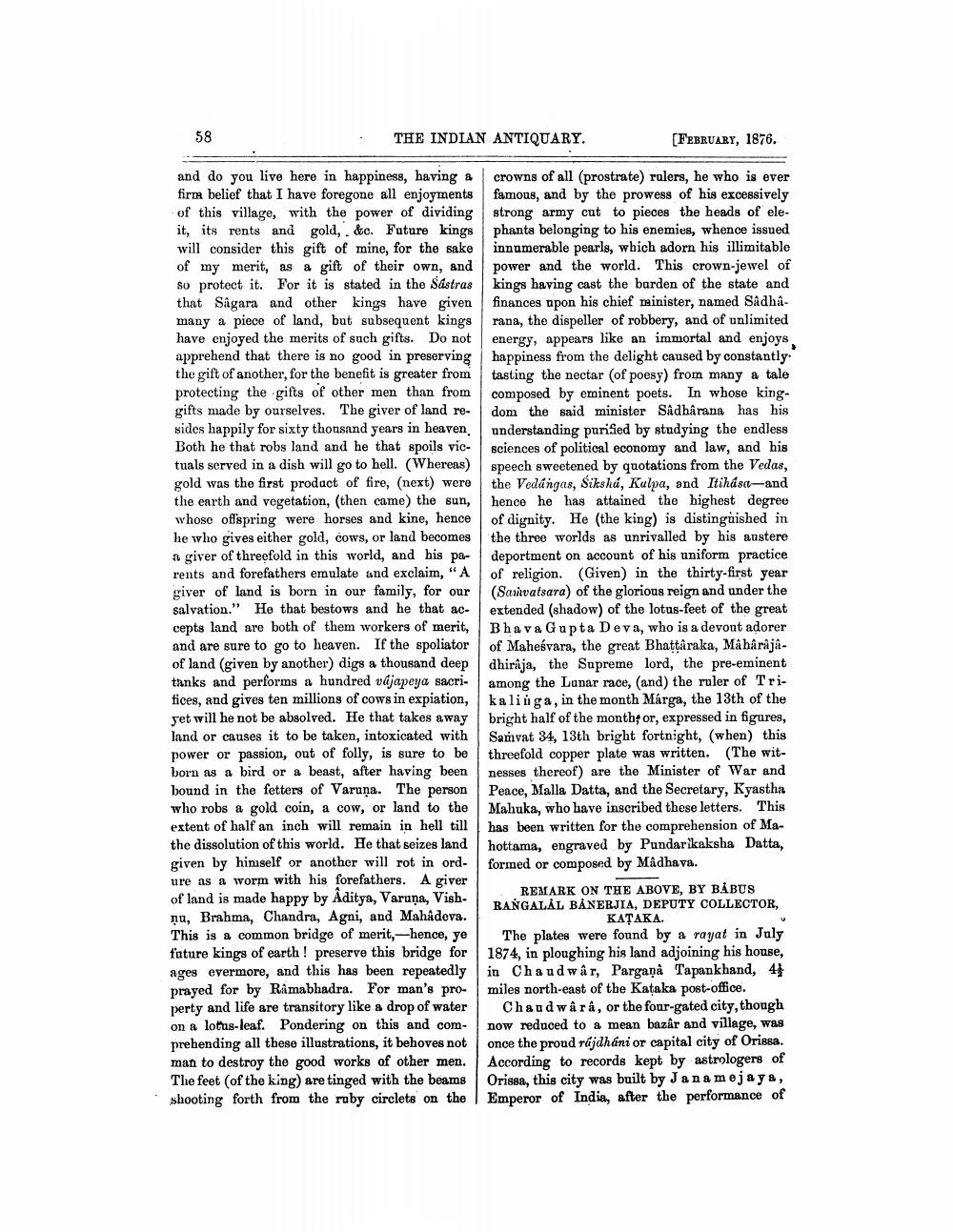________________
58
THE INDIAN ANTIQUARY.
and do you live here in happiness, having a firm belief that I have foregone all enjoyments of this village, with the power of dividing it, its rents and gold,. &c. Future kings will consider this gift of mine, for the sake of my merit, as a gift of their own, and so protect it. For it is stated in the Sastras that Sagara and other kings have given many a piece of land, but subsequent kings have enjoyed the merits of such gifts. Do not apprehend that there is no good in preserving the gift of another, for the benefit is greater from protecting the gifts of other men than from gifts made by ourselves. The giver of land resides happily for sixty thousand years in heaven, Both he that robs land and he that spoils victuals served in a dish will go to hell. (Whereas) gold was the first product of fire, (next) were the earth and vegetation, (then came) the sun, whose offspring were horses and kine, hence he who gives either gold, cows, or land becomes a giver of threefold in this world, and his parents and forefathers emulate and exclaim, "A giver of land is born in our family, for our salvation." He that bestows and he that accepts land are both of them workers of merit, and are sure to go to heaven. If the spoliator of land (given by another) digs a thousand deep tanks and performs a hundred vajapeya sacrifices, and gives ten millions of cows in expiation, yet will he not be absolved. He that takes away land or causes it to be taken, intoxicated with power or passion, out of folly, is sure to be born as a bird or a beast, after having been bound in the fetters of Varuna. The person who robs a gold coin, a cow, or land to the extent of half an inch will remain in hell till the dissolution of this world. He that seizes land given by himself or another will rot in ordure as a worm with his forefathers. A giver of land is made happy by Aditya, Varuna, Vishnu, Brahma, Chandra, Agni, and Mahadeva. This is a common bridge of merit, hence, ye future kings of earth! preserve this bridge for ages evermore, and this has been repeatedly prayed for by Ramabhadra. For man's property and life are transitory like a drop of water on a lotus-leaf. Pondering on this and comprehending all these illustrations, it behoves not man to destroy the good works of other men. The feet (of the king) are tinged with the beams shooting forth from the ruby circlets on the
[FEBRUARY, 1876.
crowns of all (prostrate) rulers, he who is ever famous, and by the prowess of his excessively strong army cut to pieces the heads of elephants belonging to his enemies, whence issued innumerable pearls, which adorn his illimitable power and the world. This crown-jewel of kings having cast the barden of the state and finances upon his chief minister, named Sâdhârana, the dispeller of robbery, and of unlimited energy, appears like an immortal and enjoys, happiness from the delight caused by constantly. tasting the nectar (of poesy) from many a tale composed by eminent poets. In whose kingdom the said minister Sâdhârana has his understanding purified by studying the endless sciences of political economy and law, and his speech sweetened by quotations from the Vedas, the Vedangas, Sikshá, Kulpa, and Itihasa-and hence he has attained the highest degree of dignity. He (the king) is distinguished in the three worlds as unrivalled by his austere deportment on account of his uniform practice of religion. (Given) in the thirty-first year (Samvatsara) of the glorious reign and under the extended (shadow) of the lotus-feet of the great Bhava Gupta Deva, who is a devout adorer of Maheśvara, the great Bhattaraka, Mâhârâjâdhiraja, the Supreme lord, the pre-eminent among the Lunar race, (and) the ruler of Trikalinga, in the month Márga, the 13th of the bright half of the month; or, expressed in figures, Samvat 34, 13th bright fortnight, (when) this threefold copper plate was written. (The witnesses thereof) are the Minister of War and Peace, Malla Datta, and the Secretary, Kyastha Mahuka, who have inscribed these letters. This has been written for the comprehension of Mahottama, engraved by Pundarikaksha Datta, formed or composed by Madhava.
REMARK ON THE ABOVE, BY BABUS RANGALAL BANERJIA, DEPUTY COLLECTOR,
KATAKA.
The plates were found by a rayat in July 1874, in ploughing his land adjoining his house, in Chaudwâr, Pargana Tapankhand, 4 miles north-east of the Kataka post-office.
Chaudwârâ, or the four-gated city, though now reduced to a mean bazâr and village, was once the proud rajdhani or capital city of Orissa. According to records kept by astrologers of Orissa, this city was built by Jana mejaya, Emperor of India, after the performance of




